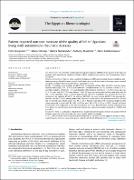| dc.contributor.author | Bongomin, Felix | |
| dc.contributor.author | Sekimpi, Maria | |
| dc.contributor.author | Natukunda, Barbra | |
| dc.contributor.author | Makhoba, Anthony | |
| dc.contributor.author | Kaddumukasa, Mark | |
| dc.date.accessioned | 2021-04-27T14:28:04Z | |
| dc.date.available | 2021-04-27T14:28:04Z | |
| dc.date.issued | 2021-06 | |
| dc.identifier.citation | Bongomin, F., Sekimpi, M., Natukunda, B., Makhoba, A. and Kaddumukasa, M., 2021. Patient-reported outcome measure of the quality of life in Ugandans living with autoimmune rheumatic diseases. The Egyptian Rheumatologist, 43(3), pp.203-207. | en_US |
| dc.identifier.issn | 1110-1164 | |
| dc.identifier.uri | http://hdl.handle.net/20.500.12280/2760 | |
| dc.description.abstract | Aim of the work: To assess the patient reported outcome measure (PROM) of the quality of life (QoL) of patients with autoimmune rheumatic diseases (RDs) attending two tertiary care rheumatology clinics in Uganda.
Patients and methods: Patients with a confirmed diagnosis of RD and receiving disease modifying anti-rheumatic drugs (DMARDs) were studied. Health index and overall self-rated health status were assessed using the EuroQol 5-dimension (ED-5D-5L) questionnaire tool.
Results: 74 patients were studied: 48 (64.9%) had rheumatoid arthritis (RA), 14(18.9%) systemic lupus erythematosus (SLE), and 12(16.2%) had other RDs; spondyloarthritis (n = 5), systemic sclerosis (n = 3), juvenile idiopathic arthritis (n = 2), and idiopathic inflammatory myositis (n = 2). Their mean age was 45 ± 17 years and 69 (93.2%) were female. 14(18.9%) were on concomitant herbal medication and 26 (35.1%) self-reported at least 1 adverse drug reaction. Any level of problem was reported by 54(72.5%)
participants for mobility, 47(63.5%) for self-care, 56(75.6%) for usual activity, 66(89.1%) for pain and dis-comfort, and 56(75.6%) for anxiety/depression. The mean health index of the patients was 0.64 ± 0.16 and the overall self-rated health status was 58.1 ± 16.7. Patients with SLE (0.74 ± 0.12) had higher health index compared to those with RA (0.60 ± 0.17) or other RDs (0.70 ± 0.1) (p < 0.007). Overall self-rated health status was comparable across clinical diagnoses (p = 0.23). Both the index and self-reported status were better for patients who received private hospital care compared to public hospital (p < 0.0001 and
p = 0.01).
Conclusion: There is a substantial negative impact of autoimmune rheumatic diseases on quality of life of patients, especially those receiving care from a public facility in Uganda. | en_US |
| dc.language.iso | en | en_US |
| dc.publisher | Elsevier | en_US |
| dc.relation.ispartofseries | The Egyptian Rheumatologist;43(3) | |
| dc.subject | Autoimmune rheumatic diseases | en_US |
| dc.subject | SLE | en_US |
| dc.subject | Rheumatoid arthritis | en_US |
| dc.subject | Health index | en_US |
| dc.subject | Patient-reported outcomes | en_US |
| dc.subject | DMARDs | en_US |
| dc.subject | Uganda | en_US |
| dc.title | Patient-Reported Outcome Measure of the Quality of Life in Ugandans Living With Autoimmune Rheumatic Diseases | en_US |
| dc.type | Article | en_US |


